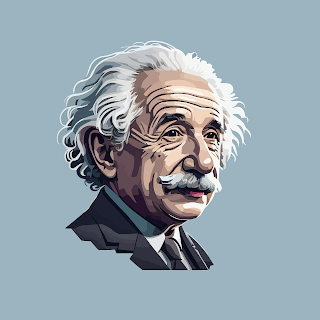The great scientist uncovering the mysteries of the universe ! Albert Einstein
Introduction:
Albert Einstein, born on March 14, 1879, in Ulm, Germany, emerged as one of the greatest scientific minds in history. His profound contributions to physics transcended conventional boundaries and reshaped humanity's understanding of the universe. Beyond the iconic equation E=mc^2, Einstein's intellectual legacy encompasses a myriad of scientific advancements that continue to influence our world.
Early Life and Education:
Raised in a middle-class Jewish family, Einstein displayed an early affinity for mathematics and physics. His parents, Hermann and Pauline Einstein, recognized his extraordinary talent and supported his educational pursuits. Einstein attended the Swiss Federal Institute of Technology in Zurich, initially intending to become a teacher in physics and mathematics. However, his independent thinking and rebellious spirit led to a disconnect with the academic environment.
The Annus Mirabilis Papers:
In 1905, famously known as his "Annus Mirabilis" or miracle year, Einstein published four seminal papers that revolutionized physics. These papers addressed phenomena such as the photoelectric effect, Brownian motion, and introduced the theory of special relativity. The photoelectric effect paper, in particular, laid the groundwork for the development of quantum theory.
Special and General Relativity:
Einstein's theory of special relativity, unveiled in 1905, challenged established notions of space and time. It posited that the laws of physics are consistent for all non-accelerating observers. His subsequent theory of general relativity in 1915 provided a new understanding of gravity, attributing it to the warping of space-time by massive objects.
Political Activism and Later Life:
Beyond his scientific pursuits, Einstein was an outspoken advocate for civil rights, pacifism, and Zionism. Escaping the rise of the Nazi regime in 1933, Einstein sought refuge in the United States. There, he accepted a position at the Institute for Advanced Study in Princeton, becoming an integral part of the American scientific community.
Einstein's political activism intensified during the turbulent period of World Wars, reflecting his commitment to global peace and justice. His relocation to the United States marked a new chapter in his life, where he continued to contribute to scientific advancements and became a prominent figure in academia.
Legacy and Passing:
Albert Einstein's impact on science and society is immeasurable. His work laid the foundation for modern physics, earning him accolades such as the Nobel Prize in Physics in 1921 for his explanation of the photoelectric effect. On April 18, 1955, Einstein passed away in Princeton, New Jersey, leaving behind a lasting legacy that transcends disciplines. His unparalleled intellect and relentless curiosity continue to inspire generations of scientists and thinkers worldwide. In the words of the great physicist himself, "The important thing is not to stop questioning. Curiosity has its own reason for existing.




Comments
Post a Comment